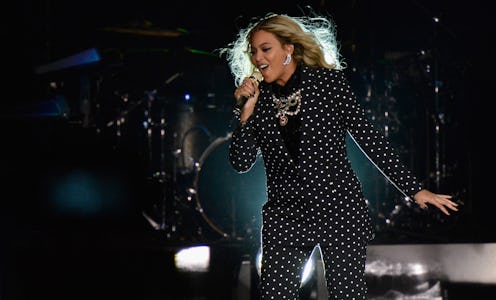Entertainment
Don't Ask When Beyoncé Will Return To The Stage

Beyoncé has long represented female empowerment. Over the years, she's excelled as a singer, dancer, actor, creator, and entrepreneur. Her albums are a powerful examination of womanhood and a source of inspiration for many. Beyoncé succeeds in any role, to a point where she seems untouchable, almost beyond criticism. Yet, it speaks volumes that in our society, not even Beyoncé is immune to the questions and quandaries that pregnancy and motherhood bring up. For some reason, motherhood enables our culture to ask women questions that otherwise would be considered impolite. For working women, the question of when, and even if, they will "return" to their careers post-baby is not uncommon. But, now that she's reportedly had her twins, Beyoncé can resume her career whenever she wants to — as can any other woman — and nobody should question when that will be.
This question of how long women will spend being just a mother is inherently gendered. No one is going to ask Jay Z how long he intends to just be a dad before returning to his business empire or dropping his next guest verse. There's a reason that fathers are never asked about their paternity leave or parenting plans; women are, by default, expected take on more of the burden of parenting. According to a study done by the Pew Research Center in 2015, working women are still taking on more family responsibilities than men, which makes it more difficult to advance professionally. This is statistical evidence that our expectation of mothers and fathers differ.
When women, even Beyoncé, are asked how long they will take off from their career, it is a question that, intentionally or not, shames. It implies that women who return to their careers too early aren't mothering enough. Conversely, if a woman doesn't return to her career soon enough, her professional setbacks are seen as her own choice. There's no winning, and the only answer is to recognize that no matter when Beyoncé decides to return to making and performing music, it will be the perfect time.
Of course, performances are another reason fans or critics might try to justify this question. When the singer first announced her pregnancy, many wondered about two big shows: the Grammys and Coachella. Of course, Queen B then hit back with an incendiary, symbolic Grammy performance, but chose to postpone stepping onto the desert festival stage until next year.
Then there's the obsession with the post-baby body. After Blue Ivy was born, countless articles were published about how Beyoncé got her body "back" after pregnancy. Women's postpartum bodies are often criticized or scrutinized online, and celeb women are encouraged to lose weight and be back to their pre-baby weight and shape in an unrealistic period of time. In a perfect world, fans and critics will leave Beyoncé alone after giving birth to the twins, but given the cultural obsession with post-baby diet and exercise regimens, that's unlikely.
The anxiety over when Beyoncé will perform again comes back to this idea that pregnancy indicates a sort of physical retirement. Serena Williams faced this kind of criticism after announcing her pregnancy, as have other Olympians. Since Beyoncé's work is based in dancing and movement, these critiques affect her, as well. Obviously, Bey doesn't owe anyone anything in regards to touring and performing, but if on stage is where she wants to be, even shortly after giving birth, she can and will be there.
It is true that for many female celebs, having children felt like it would have to involved a sacrifice. This only indicates the need for a shift in attitude and structures, like paid maternity leave or a universal belief that the gender disparity in parenting should be remedied. Then society will be set up to enable women to be both mothers and creators, and it can come to terms with the fact that these roles can coexist.
Modern society continues to struggle to reconcile women's role as valuable workers, artists, and entrepreneurs with motherhood. For Beyoncé, it will likely be easy to resume her career when she pleases, and it's important not to question when the timing of that is. In a greater context, this should be a right for all women; all women who have children should feel like they can return to creative or business life whenever they are ready. There are so many ways that social and political structures should enable them to do so, but consistently fail to. Hopefully, Beyoncé's future success will inspire some of this change.